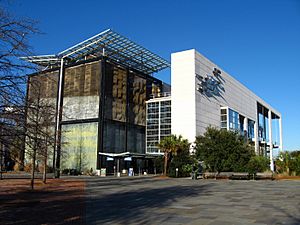South Carolina Aquarium facts for kids
 |
|
| Date opened | May 19, 2000 |
|---|---|
| Location | Charleston, South Carolina, USA |
| Coordinates | 32°47′28″N 79°55′32″W / 32.79111°N 79.92556°W |
| No. of animals | 10,000+ |
| Volume of largest tank | 385,000 US gallons (1,460,000 L; 321,000 imp gal) |
| Memberships | AZA |
The South Carolina Aquarium is a super cool place in Charleston, South Carolina. It opened on May 19, 2000, right on the beautiful Charleston Harbor. This aquarium is home to over 10,000 plants and animals!
You can see amazing creatures like North American river otters, huge loggerhead sea turtles, and even alligators. They also have great blue herons, owls, and tiny lined seahorses. Don't forget the wiggly jellyfish, puffy pufferfish, and long green moray eels. You can also spot horseshoe crabs, sea stars, pythons, and scary sharks.
One of the biggest attractions is the Great Ocean Tank. It goes from the first floor all the way up to the third floor! This tank is the deepest in North America, reaching 42 feet down. It holds over 385,000 gallons of water and has more than 700 animals living in it. There's also a fun Touch Tank where you can gently feel horseshoe crabs, Atlantic stingrays, and other ocean friends.
Contents
Discover Amazing Exhibits at the Aquarium
The South Carolina Aquarium is built right into the Charleston Harbor. It's like a giant learning center about nature in South Carolina. You can explore different areas, from the mountains to the ocean. The building is huge, about 93,000 square feet!
Inside, there are 9 main galleries with 6,000 to 7,000 amazing water animals. You can see everything from playful river otters to giant sharks. There are over 100 different exhibits to explore.
Journey Through South Carolina's Habitats
The aquarium shows you the journey of water across South Carolina. This includes the Mountain Forest, the Piedmont (foothills), the Coastal Plain, the Coast, and the Ocean. Each area has animals and plants that live there.
Exciting Rotating Exhibits
The aquarium often has special exhibits that change over time.
- "Secrets of the Amazon" once showed animals and plants from the Amazon River.
- "Camp Carolina" let you experience what camping in the mountains of South Carolina is like. This exhibit featured animals like skunks, barn owls, snakes, and even a bald eagle.
- "Penguin Planet" was a popular exhibit with four Magellanic penguins.
- The Salt Marsh exhibit was updated, and now you can even feed the stingrays!
- "Madagascar Journey" brought cool animals like ring-tailed lemurs, tomato frogs, and a Nile crocodile.
Zucker Family Sea Turtle Recovery: Helping Turtles Heal
In 2017, a very special exhibit opened called Zucker Family Sea Turtle Recovery. This is a permanent exhibit where you can see real sick and injured sea turtles getting better! It's like a hospital for turtles. You can watch the staff care for them.
There are also fun, interactive stations where you can learn why sea turtles get sick. You can even pretend to be a turtle doctor and diagnose a patient! A theater shows what happens after a turtle is healthy enough to leave the hospital. This area also has a special research center for sea turtles.
Sea Turtle Care Center: Rescuing and Releasing Turtles
The South Carolina Aquarium does more than just teach people about sea turtles. It also runs a real Sea Turtle Hospital! When a loggerhead sea turtle is hurt or stranded, the South Carolina Department of Natural Resources brings it here. Then, the aquarium's staff and volunteers work hard to help the turtle get healthy again.
How Turtles Get Better
The hospital has a special veterinarian who can do surgery on turtles. They can also take X-rays, give IVs, and even give blood transfusions if a turtle is very weak. Since 2017, they even have a CT scanner to help them see inside the turtles better. The Zucker Family Sea Turtle Recovery exhibit helped the aquarium treat even more sick turtles.
Once a turtle is healthy, it gets to go back home! The staff takes the recovered turtles to a local beach. They are then released back into the ocean. It usually takes about 7 to 8 months for an injured turtle to get well enough to go home. Since 2000, the South Carolina Aquarium has helped over 250 sea turtles return to the wild. They also have a special research center to learn even more about sea turtles.
Images for kids
-
"Liberty", a bald eagle rescued from Naples, Florida, lives at the Charleston aquarium.
 | Laphonza Butler |
 | Daisy Bates |
 | Elizabeth Piper Ensley |






